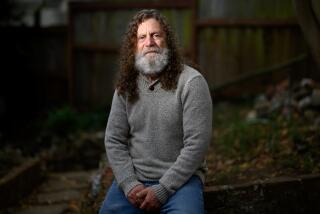Nature and nurture entwining to shape human behavior
- Share via
For centuries now, the debate has raged between those who believe human beings are born with certain innate qualities and those who believe we are the products of what we experience.
Even before modern scientists began arguing the conflicting claims of heredity and environment, philosophers and theologians engaged in disputes about determinism versus free will, pitting the idea of an unchangeable human nature against that of the human mind as a blank slate to be formed by its experiences. For much of the 20th century, the nurture side of the debate seemed to be winning the day, with much emphasis placed on how parenting, schooling and social conditions influence personality and behavior.
But with the explosion of knowledge in the field of genetics, the pendulum seems to have swung back in the opposite direction, with genes being credited (or blamed) for almost everything.
The chief point that the popular science writer Matt Ridley, author of the bestselling book “Genome,” wishes to make in “Nature Via Nurture” is that the time-honored dichotomy of heredity versus environment (nature versus nurture) is a false one. “Learning,” Ridley writes, “could not happen without an innate capacity to learn. Innateness could not be expressed without experience. The truth of each idea is not proof of the falsehood of another.”
The key to understanding this apparent paradox is in understanding the complex, multifunctional nature of genes themselves. As Ridley explains, genes are not simply the agents for transmitting certain traits from parents to children. Genes continue to be active throughout life, switching on and off, influencing the various stages of an individual’s development and reacting to events in his or her environment: “Right now, somewhere in your head, a gene is switching on, so that a series of proteins can go to work altering the synapses between brain cells so that you will, perhaps, forever associate reading this paragraph with the smell of coffee seeping in from the kitchen ....
“I cannot emphasize the next sentence strongly enough. These genes are at the mercy of our behaviour; not the other way around. The things that make Pavlov’s associations are made of the same stuff as the chromosomes that carry heredity. Memory is ‘in the genes’ in the sense that it uses genes, not in the sense that you inherit memories.”
Although he does a splendid job of showing us the impossibility of disentangling genes from the environment that nurtures them, it is only in his penultimate chapter that Ridley gets around to explaining “The Seven Meanings of ‘Gene,’ ” an enlightening discussion that should perhaps have come earlier in the book. And even he does not completely succeed in making it crystal clear to the layman exactly how genes and proteins interact (perhaps because he waits until halfway through the book to explain that “a gene is a stretch of DNA letters encoding the recipe for a protein”). But the gist of his message is clear enough: Diverse species of animals share many of the same genes, yet those genes develop very differently.
“Nature Via Nurture” covers an amazing range of fascinating material, bringing us up to date on recent discoveries in genetics, neuroscience and psychiatry as well as animal and human psychology. Whether he is describing the social behavior of gorillas, chimps and bonobos, recounting the careers of men like B.F. Skinner and Jean Piaget or explaining the different theories of what causes schizophrenia, Ridley’s enthusiasm for his subject is contagious. He writes with panache, wit and humor and displays remarkable ingenuity in finding ways to present complicated materials for the lay reader.
Thus, it is disconcerting, amid so much subtlety, balance and common sense, to discover some gross over-generalizations. Children have no interest in sex or romance until they reach adolescence, he writes. Women and gay men, he informs us, are more interested in people than football; heterosexual men are more interested in football than people. Are straight men therefore unfit to be psychiatrists, teachers, ministers, writers, artists, politicians or social workers? Playing, coaching or commenting on sports would seem the only professions for which they’d qualify.
And although the poet William Blake may have believed that what women and men seek in each other are “the lineaments of gratified desire,” Ridley insists that what men look for in a mate is beauty, while what a woman wants in a man is money.
Ridley has some valuable things to say, however, about the perceived clash between science and morality. Many people, including some scientists, he notes, are alarmed by the ideas of sociobiologists (like Edward O. Wilson) who suggest that a lot of repugnant human behavior (aggression, jealousy, greed, violence) is “natural” -- traceable to our genes. Ridley is prepared to accept such sociobiological ideas because he believes they are true. But he is also unalarmed by their potential ethical fallout. To admit that something is “natural,” he rightly reminds us, does not necessarily mean that it is also moral, desirable or even healthy: “In my morality, and I hope in yours, some things are bad but natural, like dishonesty and violence; others are good, but less natural, like generosity and fidelity.” After all, as any germ can testify, disease is natural.






